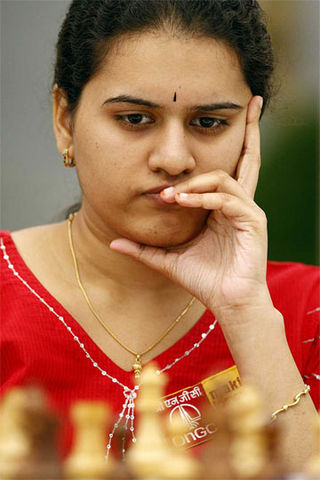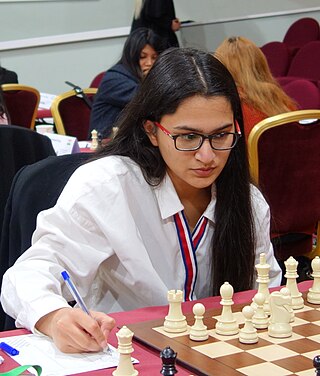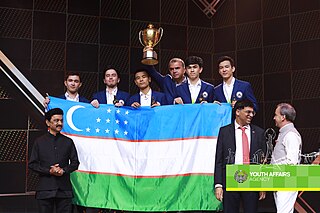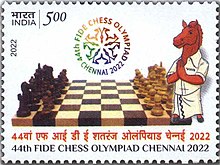
The International Chess Federation or World Chess Federation, commonly referred to by its French acronym FIDE, is an international organization based in Switzerland that connects the various national chess federations and acts as the governing body of international chess competition. FIDE was founded in Paris, France, in 1924. Its motto is Gens una sumus, Latin for 'We are one Family'. In 1999, FIDE was recognized by the International Olympic Committee (IOC). As of December 21, 2023, there are 201 member federations of FIDE.

The Chess Olympiad is a biennial chess tournament in which teams representing nations of the world compete. FIDE organises the tournament and selects the host nation. Amidst the COVID-19 pandemic, FIDE held an Online Chess Olympiad in 2020 and 2021, with a rapid time control that affected players' online ratings.

Koneru Humpy is an Indian chess grandmaster. Humpy is a runner-up of the Women's World Chess Championship and the reigning two-time Women's World Rapid Chess Champion. In 2002, she became the youngest woman ever to achieve the title of Grandmaster aged 15 years, 1 month, 27 days, a record only since surpassed by Hou Yifan. Humpy is a gold medalist at the Olympiad, Asian Games, and Asian Championship. She is also the first Indian female grandmaster.

Krishnan Sasikiran is an Indian chess grandmaster.

Anna Yuriyivna Ushenina is a Ukrainian chess grandmaster who was Women's World Chess Champion from November 2012 to September 2013.

The All India Chess Federation is the administrative body for the game of chess in India. Founded in 1951, the association is affiliated to the Asian Chess Federation and the International Chess Federation. Nitin Narang is the president of the federation. AICF's headquarters are in New Delhi.

The 41st Chess Olympiad, organised by the Fédération Internationale des Échecs (FIDE) and comprising an open and women's tournament, as well as several events designed to promote the game of chess, was an international team chess event that took place in Tromsø, Norway, between 1–14 August 2014. The organiser was Chess Olympiad Tromsø 2014 AS on behalf of FIDE.
Chess has risen in popularity in India in the last few decades primarily due to the popularity and efforts of chess Grandmaster and former 5-time World Champion Viswanathan Anand.

Nodirbek Abdusattorov is an Uzbek chess grandmaster. A chess prodigy, he qualified for the grandmaster title at the age of 13 years, 1 month, and 11 days. FIDE awarded him the title in April 2018. He is Uzbekistan's highest-rated grandmaster and currently one of the best chess players in the world.

Vaishali Rameshbabu is an Indian chess grandmaster. Vaishali and her brother Praggnanandhaa Rameshbabu are the first brother-sister duo to earn GM titles. They are also the first brother-sister duo to qualify for the Candidates Tournament.

Rameshbabu Praggnanandhaa, also known professionally as Pragg, is an Indian chess grandmaster. As of 2 September 2024, Praggnanandhaa is ranked 12th in the world by the International Chess Federation. Praggnanandhaa and his sister Vaishali are the first brother and sister to earn GM titles. They are also the first brother and sister to qualify for the Candidates Tournament.

The 43rd Chess Olympiad, organised by the Fédération Internationale des Échecs (FIDE) and comprising open and women's tournaments, as well as several events designed to promote the game of chess, was an international team chess event held in Batumi, Georgia, from 23 September to 6 October 2018. This was the first Chess Olympiad to take place in Georgia with the Georgian Chess Federation also hosting the Chess World Cup 2017 in Tbilisi.

Gukesh Dommaraju is an Indian chess grandmaster and the reigning World Chess Champion. A chess prodigy, Gukesh is the youngest undisputed world champion, the youngest player to have surpassed a FIDE rating of 2750, doing so at the age of 17, and the third-youngest to have surpassed 2700 Elo at the age of 16. He earned the title of grandmaster at the age of 12 and is the third-youngest grandmaster in chess history.

Pallathur Venkatachalam Nandhidhaa is an Indian chess player from the state of Tamilnadu, who holds the FIDE titles of Woman Grandmaster (WGM) and Woman International Master (WIM). She is the 17th Woman Grandmaster of India. Her peak FIDE ELO rating is 2380 and she is holding 8 International Master norms as of April 2024. She is the reigning Nationals Women Chess Champion in 2024.

Anna Yolanda Cramling Bellón is a Swedish-Spanish chess player, Twitch live streamer, and YouTuber who holds the title of Woman FIDE Master (WFM). She had a peak FIDE rating of 2175 in March 2018. Cramling represented Sweden in the 2016 and 2022 Chess Olympiad as well as two European Team Chess Championships.
Puteri Munajjah Az-Zahraa binti Azhar is a Malaysian chess player who holds the FIDE title of Woman International Master (2019), making her the third Malaysian to earn that title, after Audrey Wong Su Yi (1985) and Siti Zulaikha Foudzi (2006).

Vantika Agrawal is an Indian chess player who holds the FIDE titles of Woman Grandmaster and International Master. She is a three-time gold medalist at the Chess Olympiad including two gold medals at the 45th Chess Olympiad in 2024 at Budapest. She won a silver medal with the Indian Team at the Hangzhou 2022 Asian Games. Agrawal's accolades also include medals in Commonwealth, World Youth, Asian Youth and National Championships.

The open event at the 44th Chess Olympiad was held from 29 July to 9 August 2022. It was contested by a record number of 188 teams, representing 186 nations. India, as host nation, fielded three teams. A total of 937 players participated in the open event.
The women's event at the 44th Chess Olympiad was held from 29 July to 9 August 2022. It was contested by a record number of 162 teams, representing 160 nations. India, as host nation, fielded three teams. A total of 799 players participated in the women's event.

The 45th Chess Olympiad was an international team chess event organised by the International Chess Federation (FIDE) in Budapest, Hungary, from 10 to 23 September 2024.
 Logo of the 44th Chess Olympiad
Logo of the 44th Chess Olympiad



















